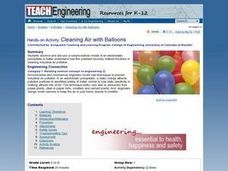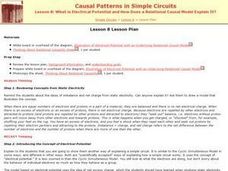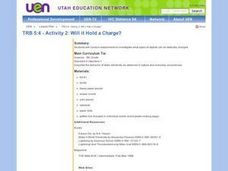Curated OER
Electrical Circuits
In this electrical circuits learning exercise, learners read a text and examine a diagram to learn the parts of a simple electric circuit. Students then answer 6 questions about electrical circuits. This is an online interactive learning...
Curated OER
Electricity and Circuits
In this electricity and circuits worksheet, learners read a 2 page article, answer 5 questions with multiple choice answers and read 10 statements and determine if they are true or false.
Curated OER
Unit V: Worksheet 4 - Constant Force
Neat and succinct, here is a worksheet that provides problem-solving practice for your physics fans. They calculate acceleration and friction coefficients. They also draw force diagrams and analyze blocks moving across various surfaces....
Curated OER
Electricity Lesson Plan
Students conduct experiments on static electricity using the Internet. They compose a 30 second electricity safety jingle to be aired on a local radio station.
Curated OER
Electrical Circuits
Students explore parallel and series circuits. In this electrical circuit activity, students investigate the differences between series and parallel circuits. Students observe the benefits and drawbacks of series and parallel...
Curated OER
TE Lesson: Factors Affecting Friction
Students investigate the effect of weight on normal friction or the friction due to surface roughness. They tell about the effects of contact area that occurs as a result of molecular attraction by looking at data on line graphs.
Curated OER
Wimhurst Electrostatic Generator Interactive Demonstration
Students participate in an interactive demo using the Wimhurst generator. In this physics lesson, students draw the charge distribution in the pith ball. They explain how they acquire charges without actually touching the generator.
Curated OER
What is Lightning?
Students experiment with electricity to understand lightning. In this lightning lesson, students show how static electricity causes lightning. Students discuss questions about their experiment and gather important facts. Students...
Curated OER
Cleaning Air with Balloons
Students examine how a pollutant recovery method functions in cleaning industrial air pollution. They listen to a teacher-led discussion, conduct an experiment with balloons, static electricity, and pepper, and observe and record the...
Curated OER
Lightning in a Jar
Students create lightning with two common objects and observe the colorful "discharge" of electrons on a smaller scale. By exploring the phenomena of static electricity, students relate their knowledge to the real-life weather phenomena...
Curated OER
Exploring Meteorite Mysteries: Building Blocks of Planets
Students simulate the formation of chondrites and asteroids. For this astronomy lesson, students demonstrate accretion using balloons and static electricity. They compare and contrast their models to the actual process of chondrites and...
Curated OER
Focusing Event to Electricity
Young scholars explain how electrical charges behave. In this electricity lesson, students determine how far away lightning is when it strikes. They research how fabric softener reduces static electricity and share their findings in...
Curated OER
Electrostatics
Students explore charges using balloons and soap bubbles. In this chemistry lesson plan, students analyze the Van de Graaf generator to see how charges flow using charged particles, static electricity and lighting. This assignment...
Curated OER
Electrical Resistivity
Students examine how materials oppose the flow of an electrical current. In this resistivity lesson students complete several experiments on the differences between resistance and resistivity.
Curated OER
Its Electric!
Fourth graders define the differences between static and current electricity by participating in an investigation. In this energy lesson, 4th graders utilize electrical supplies to demonstrate the differences between static and...
Curated OER
What is Electrical Potential and How Does a Relational Causal Model Explain It?
High schoolers examine models of electrical potential. Students discuss the concept of electrical potential and relational causality. They compare models based on electric potential to those with cyclic simultaneous causality.
Curated OER
What Are Static and Current Electricity?
In this electricity worksheet, students will complete a Venn diagram comparing and contrasting the characteristics of series and parallel circuits.
Curated OER
Lights Out!
Students examine static and current electricity, and discuss what their lives would be like without electricity. They listen to a teacher-led lecture about electrons and atoms, and explore static electricity using a comb or a balloon...
Curated OER
Static Cling
Fifth graders examine the principles of static electricity and positive and negative charges. They observe and then perform experiments with static electricity. They record examples in their journals.
Curated OER
Basic Electromagnetism and Electromagnetic Induction
In this electromagnetism and electromagnetic induction worksheet, students answer 12 questions about electricity, about the magnetic fields in given diagrams, about the right-hand rule and about electric current and voltage in magnetic...
Curated OER
Will it Hold A Charge?
Fifth graders discuss which materials they believe hold an electric charge. In groups, they experiment with different objects and charging them. They discuss their results after the activity.
Curated OER
Discovering Friction
Young scholars watch a demonstration that introduces them to the idea that friction is a force that impedes motion when two surfaces are in contact. They work in groups to experiment with frictional force using a coffee cup on which they...
Curated OER
Storms and Extreme Weather
Students explore hurricanes and tornadoes by conducting an experiment. In this weather pattern lesson, students define many extreme weather vocabulary terms and discuss the relationship with static electricity. Students utilize plastic...
Curated OER
Dancing Paper: Static Charge, Science
Middle schoolers use glass, plastic, paper and various other materials to investigate the properties of static charge and develop scientific inquiry skills.

























